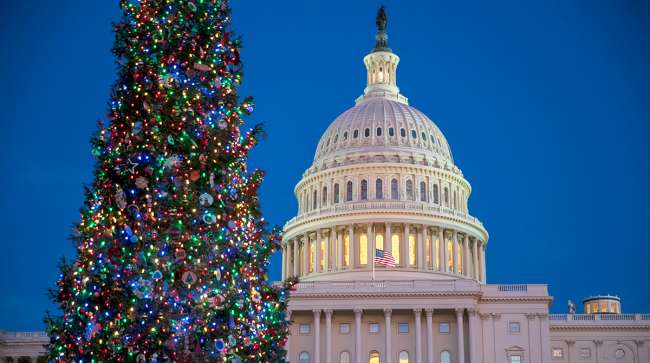Senior Reporter
Funding Negotiations Persist as Congress Looks to Avoid Partial Shutdown

With just days to go before Christmas, funding for the U.S. Department of Transportation and other agencies remained uncertain as President Donald Trump continued to push for robust funding for a wall along the border he said Mexico would pay for.
The Senate easily advanced a continuing funding resolution Dec. 19, which would keep the government funded at current levels through early February; Republicans in control of the House passed a measure containing funding for the wall Dec. 20.
Despite broad opposition to a shutdown, dozens of House Republicans supportive of stricter immigration policies back Trump’s push for $5 billion in fiscal 2019 for a wall between the United States and its neighbor to the south.
Senate Democrats already signed off on nearly $2 billion for border security in the short-term funding fix advanced in the upper chamber. Democrats are set to take control of the House in January, while remaining in the minority in the Senate.
The Senate agreed to pass a short-term continuing resolution to keep the government open. With 36 hours left to avoid a shutdown, the House must pass this continuing resolution and President Trump must sign it. https://t.co/sxa4bbUhqX — Chuck Schumer (@SenSchumer) December 20, 2018
Funding authority for about a quarter of the federal government was set to expire Dec. 21. The Department of Defense and other programs have approved funding through fiscal 2019.
Were a government shutdown to occur, about a third of DOT’s workforce would be furloughed. Also, 53,000 Transportation Security Administration staff would be tasked to work without pay, Senate Appropriations Committee Democrats emphasized.
Additionally, for freight transportation, a short-term funding fix through Feb. 8 essentially would prevent a provision on electronic logging devices pertaining to livestock haulers from being enacted. A provision in the fiscal 2019 transportation funding bills in the House and Senate would deny funding for the enforcement of ELDs for such haulers, essentially exempting them from the ELD mandate.

We're between seasons on RoadSigns but have created an intersession season as we get set for 2019. In Episode 1, we ask: How Does Congress Say Trucking? Are the planets finally aligning for movement on infrastructure funding? Hear a snippet above from Kellie Mejdrich of CQ Roll Call, and get the full program by going to RoadSigns.TTNews.com.
Any legislation not enacted prior to the Jan. 3 start of the new session of Congress would no longer be valid.
Throughout the year, executives from the livestock haulers industry told members of Congress their drivers require flexibility from federal hours-of-service rules while transporting farm animals. Since December 2017, federal law has required that truckers’ driving time be recorded by ELDs.
The mood on Capitol Hill in the last days of the 115th congressional session appeared somber in what had been an uncharacteristically high-energy lame-duck session. Senior lawmakers expressed disappointment with the prospect of having to advance another short-term funding bill this year. Congress has approved short-term fixes since missing its Oct. 1 deadline for fiscal 2019.
“This year, we made great strides to get back to regular order — in fact, funding nearly 75% of the government on time for the first time in over two decades — and that progress was incredibly important for national security and other critical priorities,” said retiring Rep. Rodney Frelinghuysen (R-N.J.), chairman of the House Appropriations Committee. “I had hoped to continue this work with the remaining 25% of the federal government.”
“Having already funded 75% of the government on time with broad bipartisan support, I am disappointed that we could not come to an agreement on the remaining 25%. However, I am committed to keeping the government open and will take the next six weeks to continue working toward that end,” said Sen. Richard Shelby (R-Ala.), the upper chamber’s top appropriator.
The president vented his frustration with Democrats’ opposition to his wall on social media.
When I begrudgingly signed the Omnibus Bill, I was promised the Wall and Border Security by leadership. Would be done by end of year (NOW). It didn’t happen! We foolishly fight for Border Security for other countries - but not for our beloved U.S.A. Not good! — Donald J. Trump (@realDonaldTrump) December 20, 2018
Democratic leaders were at the White House with Trump earlier this month, where the president told them he would own the blame for a partial shutdown that would seize funding for transportation programs and agencies that oversee financial services, the environment and public housing, among others, during the holidays.
For Trump, the wall was a major campaign promise in 2016, eliciting chants of “build that wall” at campaign rallies. He frequently insisted it would be paid for by the Mexican government. Mexico has stated it would not fund the massive infrastructure project.


